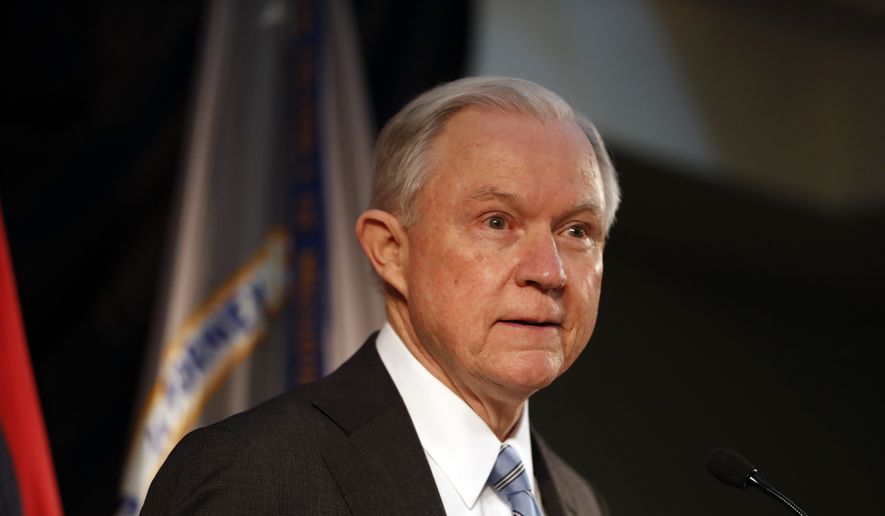The Trump administration’s Justice Department is taking steps to review court-stipulated agreements meant to reform local police departments, a move officials say is meant to improve public safety by repairing relationships with local agencies.
But civil rights advocates, who have pushed for department reforms after discovery of systematic abuses including racial profiling and excessive use of force, say the review is the first step in the DOJ abdicating its responsibility to ensure police follow the law.
The Justice Department announced the systemwide review of its active investigations of troubled law enforcement agencies late Monday, with officials taking a first step in the process hours later and requesting a postponement of an upcoming hearing on one such case involving the Baltimore Police Department.
Attorney General Jeff Sessions said the widespread review — which will encompass both “existing or contemplated” court-supervised consent decrees with local police as well as other collaborative efforts like investigations or task forces — is meant to reset and strengthen relationships with local law enforcement agencies.
“Local control and local accountability are necessary for effective local policing,” Mr. Sessions wrote in a two-page memo explaining the goals of the review. “It is not the responsibility of the federal government to manage non-federal law enforcement agencies.”
But police reform advocates call the move a betrayal, and said it’s the Justice Department’s duty to provide oversight of local law enforcement agencies with documented history of abuses.
Speaking about the Baltimore case, the president of the NAACP’s Legal Defense Fund, Sherrilyn Ifill, said DOJ’s request to postpone the hearing “is nothing more than a blatant attempt by the Justice Department to abandon its obligations under federal civil rights law and the U.S. Constitution to ensure that police departments are serving residents in a nondiscriminatory and constitutional manner.”
Consent decrees became a hallmark of the Obama administration’s Justice Department, with the Baltimore agreement finalized just days before President Trump was sworn into office. The Justice Department opened 25 investigations into law enforcement agencies since 2009. At the time Baltimore’s agreement was inked, the DOJ was enforcing 15 such consent decrees.
David Rocah, a senior attorney for the ACLU of Maryland, said the Justice Department’s announcement is “a clear sign that the Trump administration is seeking to undo, and walk away from, the consent decree that is a critical part of reforming Baltimore’s police department.”
“Such an action by the DOJ would be literally unprecedented in our nation’s history, and would be a gross abdication of the DOJ’s responsibility to ensure that police in Baltimore, and around the country, act within the bounds of law,” Mr. Rocah said. “Even more disturbing, the DOJ filing suggests that there is some fundamental incompatibility between addressing longstanding patterns of police misconduct and public safety. This view is not only wrong but dangerous.”
The DOJ memo states that local law enforcement “must protect and respect the civil rights of all members of the public” but it also says the “misdeeds of individual bad actors should not impugn or undermine the legitimate and honorable work that law enforcement officers and agencies perform in keeping American communities safe.”
Jim Pasco, executive director of the Fraternal Order of Police, said review can ensure that when departments come under investigation that they are not unfairly maligned in cases “where there have been one or two instances of misconduct or alleged misconduct.”
The issue came up in a meeting police officials had with Mr. Trump and Mr. Sessions last week, but Mr. Pasco said he came away with no indication of what outcome the administration sought from the review.
“I hope they will take a look at the investigations to ensure that if in fact anything untoward has occurred that the consent decree and the remedy it imposes will improve the relationship between the city and the department rather than pillorying the department by painting all the police officers as villains,” Mr. Pasco said.
The DOJ’s blistering report on Baltimore police, undertaken after the 2015 death of Freddie Gray, found that officers unconstitutionally stopped and searched residents, disproportionately targeted black residents and frequently resorted to physical force during interactions that didn’t warrant it.
The review, released in August, found the Baltimore Police Department engaged in a pattern of conduct that violated city residents’ constitutional and federal rights, noting that black residents accounted for 84 percent of stops while they represent 63 percent of the city’s population, and for 95 percent of the 410 people stopped at least 10 times over a 5-year period. It also raised serious concern about how the department responds to and investigates reports of sexual assault.
The DOJ’s court filing in the Baltimore case notes that the department is “aware of the need for police reform in Baltimore and of the need to rebuild public confidence in law enforcement.” But it states that the DOJ may consider progress that BPD has already made toward reform efforts when it considers future compliance of the agreement.
The Baltimore mayor and police commissioner have both said they saw no need to delay the court hearing.
• Andrea Noble can be reached at anoble@washingtontimes.com.




Please read our comment policy before commenting.